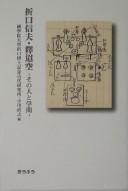| Listing 1 - 5 of 5 |
Sort by
|
Book
Abstract | Keywords | Export | Availability | Bookmark
 Loading...
Loading...Choose an application
- Reference Manager
- EndNote
- RefWorks (Direct export to RefWorks)


ISBN: 4273033631 Year: 2005 Publisher: 東京 おうふう
Abstract | Keywords | Export | Availability | Bookmark
 Loading...
Loading...Choose an application
- Reference Manager
- EndNote
- RefWorks (Direct export to RefWorks)
Book
Year: 1978 Publisher: 東京 中央公論社
Abstract | Keywords | Export | Availability | Bookmark
 Loading...
Loading...Choose an application
- Reference Manager
- EndNote
- RefWorks (Direct export to RefWorks)
Book
ISBN: 4915832104 Year: 1995 Publisher: Saitama-ken Ageo-shi : Seigakuin Daigaku Shuppankai,
Abstract | Keywords | Export | Availability | Bookmark
 Loading...
Loading...Choose an application
- Reference Manager
- EndNote
- RefWorks (Direct export to RefWorks)
Shinto --- Christianity and other religions --- Relations --- Christianity. --- Shinto. --- Origuchi, Shinobu, --- Religion.
Book
ISBN: 0520912403 0585130493 9780520912403 9780585130491 Year: 1993 Publisher: Berkeley University of California Press
Abstract | Keywords | Export | Availability | Bookmark
 Loading...
Loading...Choose an application
- Reference Manager
- EndNote
- RefWorks (Direct export to RefWorks)
In Complicit Fictions, James Fujii challenges traditional approaches to the study of Japanese narratives and Japanese culture in general. He employs current Western literary-critical theory to reveal the social and political contest inherent in modern Japanese literature and also confronts recent breakthroughs in literary studies coming out of Japan. The result is a major work that explicitly questions the eurocentric dimensions of our conception of modernity. Modern Japanese literature has long been judged by Western and Japanese critics alike according to its ability to measure up to Western realist standards--standards that assume the centrality of an essential self, or subject. Consequently, it has been made to appear deficient, derivative, or exotically different. Fujii challenges this prevailing characterization by reconsidering the very notion of the subject. He focuses on such disparate twentieth-century writers as Natsume Soseki, Tokuda Shusei, Shimazaki Toson, and Origuchi Shinobu, and particularly on their divergent strategies to affirm subjecthood in narrative form. The author probes what has been ignored or suppressed in earlier studies--the contestation that inevitably marks the creation of subjects in a modern nation-state. He demonstrates that as writers negotiate the social imperatives of national interests (which always attempt to dictate the limits of subjecthood) they are ultimately unable to avoid complicity with the aims of the state. Fujii confronts several historical issues in ways that will enlighten historians as well as literary critics. He engages theory to highlight what prevailing criticism typically ignores: the effects of urbanization on Japanese family life; the relation of literature to an emerging empire and to popular culture; the representations of gender, family, and sexuality in Meiji society. Most important is his exposure of the relationship between state formation and cultural production. His skillful weaving of literary theory, textual interpretation, and cultural history makes this a book that students and scholars of modern Japanese culture will refer to for years to come.
Japanese fiction --- Languages & Literatures --- East Asian Languages & Literatures --- History and criticism. --- History and criticism --- 20th century japan the emergence of a world power. --- 20th century japanese literature. --- asian history. --- cultural history. --- family life. --- family. --- gender. --- japan. --- japanese culture. --- japanese empire. --- japanese literature. --- literary studies. --- meiji society. --- modern japanese culture. --- modern japanese literature. --- modernism. --- modernity. --- narrative. --- nation state. --- national interests. --- natsume soseki. --- origuchi shinobu. --- sexuality. --- shimazaki toson. --- state formation. --- subjecthood. --- subjectivity. --- tokuda shusei. --- urbanization.
| Listing 1 - 5 of 5 |
Sort by
|

 Search
Search Feedback
Feedback About UniCat
About UniCat  Help
Help News
News